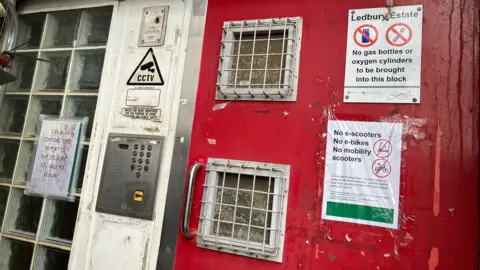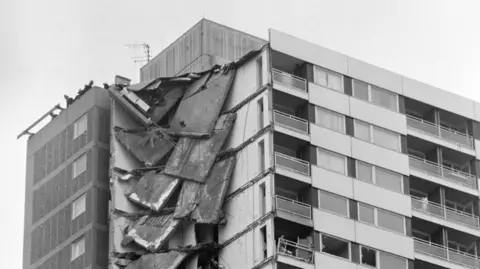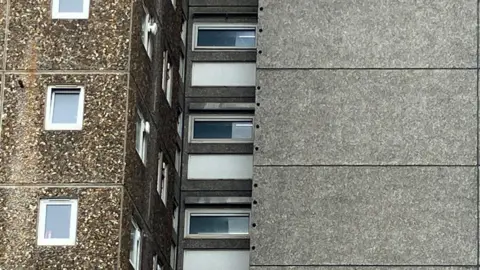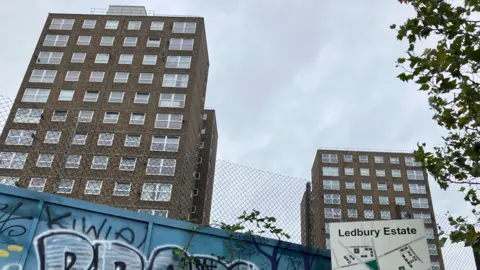Over 100 London tower blocks may have safety issues
 BBC
BBCThousands of people in London could be living in high-rise tower blocks with known safety issues, a BBC London investigation has found.
More than 100 high-rise residential buildings across the capital were built using pre-fabricated concrete panels known as Large Panel System (LPS) construction.
Not all LPS blocks are necessarily dangerous but their structure means they are more prone to defects and weaknesses. Blocks which have been strengthened or had remediation work may now be considered structurally sound.
The government told BBC London the safety issues were "long standing and well known" but some residents say they were not made aware of their building's history and risks.
After a similar block - Ronan Point in Canning Town, east London - partially collapsed in 1968, safety risks were repeatedly flagged about LPS buildings as the structures were vulnerable to collapse if there was ever an explosion.
Since then some LPS buildings have also degraded and cracks have developed in the panels, which poses a fire safety risk as the compartmentation fire containment system could fail.
Following the Grenfell Tower fire in 2017, which claimed the lives of 72 people, risks in LPS buildings were raised again.
Under the Building Safety Act 2022 tower block owners are legally required to register their building and tell the regulator if their building is an LPS one, as well as stating whether they have a gas system installed.
 PA Media
PA MediaHigh-rise tower block buildings are defined by the legislation as being more than 18m (59ft), or 7 storeys tall.
BBC London asked London's 33 local authorities, including the City of London, how many high-rise residential LPS blocks they own.
They were also asked whether any of these blocks have a gas supply, and how many of the blocks each authority planned to demolish.
The data shows they own 134 residential LPS tower blocks in the capital, and revealed more than 30 of them still have gas systems installed.
These include 26 in Westminster, four in Kingston, one in the City of London and one in Hillingdon.
Among the 28 LPS blocks earmarked for demolition are five of 16 blocks in Croydon, two of 10 in Haringey, all four blocks in Brent, three of four blocks in Ealing, all four in Enfield and all five in Waltham Forest.
Merton council said it did not have detailed information on tower blocks in the borough as they were now owned by housing associations.
Westminster City Council said it has 'a programme' to remove gas supplies from 24 of the 26 LPS blocks it owns by October 2025.
Islington and Greenwich councils did not respond to the BBC's request.

Some local authorities have removed gas heating supplies and others told residents they had to move out as soon as possible.
Shortly after the Grenfell Tower fire of 2017, a sudden evacuation was ordered on the Ledbury Estate in Peckham after LPS issues were confirmed. And leaseholders in Enfield said they were not told the building was an LPS one when purchasing the properties.
The cost of remediation is high and many councils are opting to demolish the blocks and rebuild new homes, which comply with modern building regulations.
Safety measures also include a ban on gas bottles, and more recently, lithium batteries. Others have a 24-hour waking watch.
Hannah Brack, who has researched and campaigned on LPS buildings for decades, said "all residents have the right to know if their building is LPS" and should lobby the authorities for information.

Danielle Gregory, a former resident of the Ledbury Estate who is a campaigner with Tower Blocks UK, said it was "shocking" there are still LPS blocks with a piped gas supply and that councils "need to take urgent action".
Grace Williams from London Councils, which represents local authorities in the capital, said: "Many councils have taken action with their estates and LPS buildings, but we need to work even harder with the government, the GLA, and the Building Safety Regulator."
The Ministry of Housing, Communities and Local Government said issues with LPS buildings "are longstanding and well known".
A spokesperson added: "We expect building owners to uphold their responsibility to make sure LPS high-rise residential buildings are safe."
The Health and Safety Executive, which oversees the Building Safety Regulator, said if building owners do not register they can be prosecuted.
"We are prioritising the assessment of LPS buildings, and councils have a duty to manage safety risks about the spread of fire and structural failure," a spokesperson said.
Listen to the best of BBC Radio London on Sounds and follow BBC London on Facebook, X and Instagram. Send your story ideas to [email protected]
